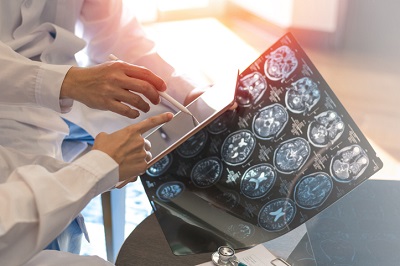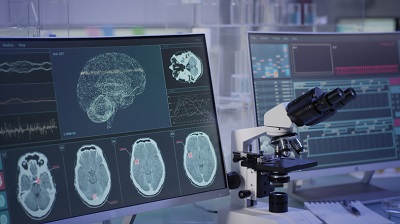The brain, like all organs and tissues, is susceptible to the effects of aging. Important changes to the structure and function of the brain over time can make a huge difference in cognitive ability, mood, memory, and overall mental and emotional well-being.
Human growth hormone supports a healthy brain long into adulthood and throughout the aging process. Individuals who maintain high HGH levels are significantly less likely to experience neurodegenerative illness (like Alzheimer’s disease) and more likely to retain their full mental faculties and positive outlook on life deep into old age.
Let’s get into the details of how aging affects the brain and what you can do to protect it.
The Structure and Function of the Brain
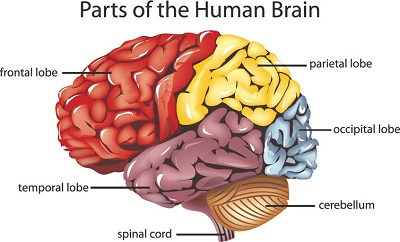 Before we get into the various aspects of aging in the brain and how to extend your youthful vitality late as long as possible, we’ll cover the structure and function of the brain.
Before we get into the various aspects of aging in the brain and how to extend your youthful vitality late as long as possible, we’ll cover the structure and function of the brain.
Brain Structure: What Are the Different Parts of the Brain and What Do They Do?
Let’s take a quick look at the different parts of the brain and what they do.
Here is a breakdown of the main parts of the brain and their functions:
- The cerebrum includes the frontal lobe, the temporal lobe, the parietal lobe, and the occipital lobe. The cerebrum regulates personality, reasoning and decision-making (cognition), memory, speech, and smell.
- The cerebellum regulates muscle movement in the central and peripheral nervous systems, posture and balance, and eye movement
- The brain stem mediates communication between the central nervous system (CNS) and the cerebrum. The brain stem controls swallowing, breathing, heartbeat, and blood pressure.
Brain Function: What Activities Does the Brain Perform and Regulate?
The wide-ranging brain functions of the brain touch on nearly every physiological process that occurs in the body. In the broadest view, the brain is responsible for:
- Maintaining homeostasis (consistent conditions inside the body)
- Sensory perception
- Movement coordination
- Memory

- Sexual arousal
- Sleep and wake cycle (circadian rhythm)
- Planning for the future
- Emotional processing
- Verbal communication
- Personality
- Information processing
- Hormone balancing
What Changes Occur Within the Brain During the Aging Process?
Over time, the following structural changes occur in the aging brain:
- Shrinkage in overall brain volume (especially in the frontal cortex). The clinical evidence indicates that “volume of the brain and/or its weight declines with age at a rate of around 5% per decade after age 40.”
- Increased blood pressure in brain blood vessels (increasing risk of stroke).
- Falling levels of critical hormones such as testosterone (for men), estrogen (for women), and human growth hormone (HGH) in both sexes.
- Changes to synapses and neurons, including dendritic sprouting.
- Loss of synapse plasticity (neuroplasticity).
Modern science has not yet achieved the capability to fully prevent or reverse aging in the brain (although the current field of research is promising). However, by following the strategies laid out in the last section of this article, you can drastically slow the process using currently available therapies and lifestyle practices.
Growth Hormone and Brain Health
Human growth hormone (HGH) affects brain function as well as how the brain ages.
What Part of the Brain Produces Human Growth Hormone?
A pea-sized gland in the brain called the pituitary gland produces and releases human growth hormone. The pituitary is a part of the hypothalamic-pituitary-adrenal axis (HPA axis) which performs important signaling work in the body such as:
- Modulating inflammatory responses vis a vis the immune system.
- Regulating the stress response.
- Keeping electrolytes in balance.
- Directing the functions of the thyroid gland, the adrenal gland, and the gonads.
- Promoting healthy tissue growth (including the brain).
Does Growth Hormone Affect Intelligence?
The answer is complicated. One study addressing the HGH-intelligence connection found that “compared with controls, children with isolated growth hormone deficiency had lower Full-Scale IQ, Verbal Comprehension Index, Processing Speed Index and Movement-Assessment Battery for Children scores.”
However, competing studies from leading research groups exploring the connection between HGH and intelligence have shown that, while HGH deficiency itself may not lower intelligence, “patients with multiple hormone deficiencies had somewhat lower IQs than patients with isolated GH deficiency.” Their conclusions indicate that an HGH deficiency if combined with another hormone deficiency or other abnormality in endocrine function, can contribute to lowered intelligence.
The bottom line is that, while HGH clearly impacts brain development, the extent to which it affects intelligence is the subject of ongoing study.
How Does HGH Affect Healthy Brain Development?
Growth hormone is closely linked to normal brain development in children. The brain contains a high concentration of growth hormone receptors, which indicates a large role that the hormone plays in healthy brain growth. Researchers looking at the HGH-brain development connection have concluded that “growth hormone deficiency impacts significantly on brain structure, cognitive function, and motor performance.”
An HGH deficiency potentially has the following effects on a developing brain my produce “abnormally small splenium of the corpus callosum, thalamus and hippocampus” and lower scores on standardized tests.
Neurogenesis, Brain Development, And Healthy Aging
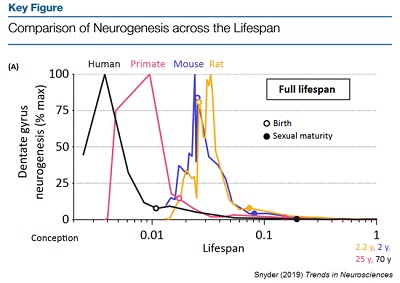
“Neurogenesis” refers to the process of generating new brain cells. The production of brain cells peaks during development in utero (in the mother’s womb) while the brain is forming. Neural stem cells (NSCs) drive neurogenesis.
Exciting current research explores the potential use of NSCs as a therapeutic treatment to prevent neurodegenerative disease.
What many patients interested in anti-aging strategies don’t realize, which the graph above illustrates, is that neurogenesis continues long into adulthood – helping to replace dysfunctional or dead brain cells with fresh, fully functional ones.
The researchers in one study looking at the anti-aging potential of adult neurogenesis concluded that “neurogenesis may be controlled to offset age- and disease-related brain injury.”
How to Stimulate Anti-Aging Neurogenesis as an Adult
Here are the proven ways you can support healthy neurogenesis even late in life:
- Neural stem cell therapy.
- Continual learning and cognitive challenge (as the folk saying goes, “use it or lose it.” The brain is the same in this respect as skeletal muscle tissue).
- Cardiovascular exercise daily.
- Frequent sex.
- Intermittent fasting (IF).
- Meditation and other mindfulness practices.
- HGH replacement therapy.
HGH and Various Aspects of Aging in the Brain
Let’s explore how human growth hormone impacts various aspects of brain health in an aging body.
How Does HGH Affect Brain Cells?
HGH has profound effects on brain cells:
- promotes neurogenesis (new brain cell growth);
- acts as a neuroprotective agent;
- stimulates myelination (the protective coating over brain cells);
- Contributes to synaptogenesis (the formation of new synapses).
HGH, Memory, and Memory Loss
HGH levels correlate strongly with memory. The medical literature divides memory in humans into four types:
- episodic memory;
- semantic memory;
- procedural memory;
- working memory.
The first two types, episodic (regarding events) and semantic memory (learned knowledge of ideas and concepts), are most impacted over time by aging in the brain. Insulin-like growth factor 2 (IGF-2), another growth hormone associated with HGH, in particular, supports healthy episodic and semantic memory. HGH optimizes blood concentrations of both IGF-1 and IGF-2.
Accordingly, individuals with growth hormone deficiency (GHD) often experience short and long-term memory loss as a symptom. HGH replacement and other growth-hormone interventions may correct these issues in those who receive it.
HGH and Cognitive Function: What’s the Connection?
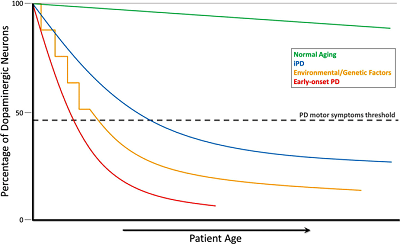 Dopamine levels in the brain fall on average by 1% per year after early adulthood. Levels of serotonin and brain-derived neurotrophic factor (BDNF) also decline. These changes substantially increase the chances of early cognitive decline and the eventual onset of neurodegenerative conditions like Alzheimer’s and Parkinson’s disease. For aging individuals who begin to experience the telltale signs of early cognitive decline, which can include lapses in working memory, difficulty concentrations, and problems with basic problem-solving, early intervention is key, which often includes lifestyle changes and hormone replacement therapy (HRT).
Dopamine levels in the brain fall on average by 1% per year after early adulthood. Levels of serotonin and brain-derived neurotrophic factor (BDNF) also decline. These changes substantially increase the chances of early cognitive decline and the eventual onset of neurodegenerative conditions like Alzheimer’s and Parkinson’s disease. For aging individuals who begin to experience the telltale signs of early cognitive decline, which can include lapses in working memory, difficulty concentrations, and problems with basic problem-solving, early intervention is key, which often includes lifestyle changes and hormone replacement therapy (HRT).
HGH Stimulates Neurogenesis, May Reverse the Effects of Aging
Exciting new research from Swedish researchers published in the Scientific American shows that “brain cells targeted for early death by continued opiate use may be salvaged by injections of synthetic human growth hormone (HGH).”
Nothing that opiate addiction creates the same effects as natural aging in the brain, the research team was able to successfully stimulate neurogenesis in the subjects they tested using human growth hormone. This study and others like it hold enormous promise for the future of anti-aging medicine with brain-boosting HGH taking a prominent role.
Other Hormones That Impact Brain Health and Aging
Abnormal fluctuations in the levels of various hormones and neurotransmitters (naturally occurring proteins that regulate brain processes) contribute to the aging process. In addition to HGH, the hormones and neurotransmitters linked to brain aging include:
- Testosterone (men).

- Estrogen (women).
- Dopamine.
- Serotonin.
- Brain-derived neurotrophic factor (BDNF).
- Insulin-like growth factor 1 (IGF-1).
- Insulin-like growth factor 2 (IGF-2).
- Follicle-stimulating hormone (FSH).
- Luteinizing hormone (LH).
- Norepinephrine.
- Cortisol (stress hormone).
How Growth Hormone Deficiency Affects Brain Health
The unfortunate hormonal reality for many is that HGH levels tend to decline as we age. If growth hormone levels fall too low, then the symptoms of growth hormone deficiency (GHD) begin to appear. The chart below indicates normal HGH levels for men and women.
| Normal HGH Levels | ||
| Adult Men | Adult Women | Children |
| 0.4-10 ng/mL | 1-14 ng/mL | 10 to 50 ng/mL |
GH suppression and GH stimulation tests – requiring a quick visit to the local lab, and a small blood sample — will determine if you have an HGH deficiency that requires attention. In addition to unwanted physical changes, GHD affects the brain and mental health by:
- Increasing the risk of depression, anxiety, and other mental health disorders.
- Feelings of isolation, hopelessness or loneliness.
- Impaired cognition (difficulty processing information).
- Poor memory.
- Limited neurogenesis.

The Top Strategies to Maintain a Sharp Mind Deep Into Old Age
It’s important to remember that chronological aging (measured in years) is not the same as biological aging. When you make the right lifestyle and healthcare choices, you are in the driver’s seat in terms of how your brain changes over time. Consider the following strategies to maintain a sharp mind deep into old age:
- Optimal diet (plenty of fresh, whole foods).
- Supplementation with natural products proven to improve brain function including omega-3 fish oils, ginkgo Biloba, and creatine.
- Regular exercise.
- Stay mentally active (read books, learn new skills, etc.).
- Limit alcohol intake.
- Don’t smoke.
- Practice intermittent fasting (HGH levels increase during fasting).
- Hormone replacement therapy (HRT) with HGH.
It’s never too late to take charge of your brain health. By following the strategies described above, you will be best prepared to resist the effects of aging. In many cases, you may be able to reverse any damage that has been done.

